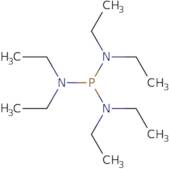Hexaethylphosphorous triamide
CAS : 2283-11-6
Ref. 3D-FH57975
| 5g | Arrêté | ||
| 10g | Arrêté | ||
| 25g | Arrêté | ||
| 50g | Arrêté | ||
| 100g | Arrêté |
Informations sur le produit
- Hept
- Hexaethyl phosphorous triamide
- Hexaethyltriamidophosphite
- Hexaethyltriaminophosphine
- N,N,N',N',N'',N''-hexaethylphosphorous triamide
- Phosphorous acid tris(diethylamide)
- Phosphorous triamide, N,N,N′,N′,N′′,N′′-hexaethyl-
- Phosphorous triamide, hexaethyl-
- Tris(N,N-diethylamino)phosphine
- Tris(diethylamido)phosphine
- Voir d'autres synonymes
Hexaethylphosphorous triamide (HEPTA) is a compound that contains a carbonyl group, carboxylic acid, and an activated hydrogen. It is used in chemical synthesis as an activating reagent for hydrogen fluoride to form chloroform. HEPTA is also used as a high-temperature solvent for reactions involving alkanoic acids and cyclohexane rings. It has shown to have good chemical stability and reaction mechanism. In addition, HEPTA has been shown to be carcinogenic in animal studies and may be related to bladder cancer or other cancers with fatty acid metabolites.
HEPTA can cause DNA damage by reacting with chlorine atoms from the environment or fatty acid in the bladder. This can lead to mutations in the genome of cells which can lead to cancer development.





